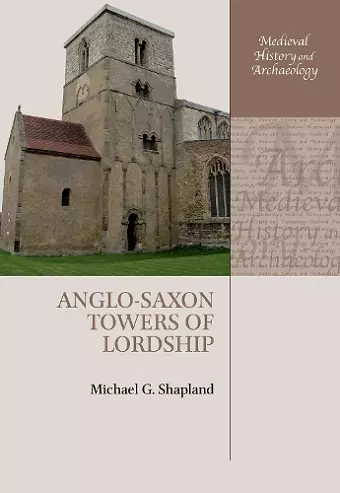Anglo-Saxon Towers of Lordship
Format:Hardback
Publisher:Oxford University Press
Published:29th Jan '19
Currently unavailable, and unfortunately no date known when it will be back

It has long been assumed that England lay outside the Western European tradition of castle-building until after the Norman Conquest of 1066. It is now becoming apparent that Anglo-Saxon lords had been constructing free-standing towers at their residences all across England over the course of the tenth and eleventh centuries. Initially these towers were exclusively of timber, and quite modest in their scale, although only a handful are known from archaeological excavation. There followed the so-called 'tower-nave' churches, towers with only a tiny chapel located inside, which appear to have had a dual function as buildings of elite worship and symbols of secular power and authority. For the first time, this book gathers together the evidence for these remarkable buildings, many of which still stand incorporated into the fabric of Norman and later parish churches and castles. It traces their origin in monasteries, where kings and bishops drew upon Continental European practice to construct centrally-planned, tower-like chapels for private worship and burial, and to mark gates and important entrances, particularly within the context of the tenth-century Monastic Reform. Adopted by the secular aristocracy to adorn their own manorial sites, it argues that many of the known examples would have provided strategic advantage as watchtowers over roads, rivers and beacon-systems, and have acted as focal points for the mustering of troops. The tower-nave form persisted into early Norman England, where it may have influenced a variety of high-status building types, such as episcopal chapels and monastic belltowers, and even the keeps and gatehouses of the earliest stone castles. The aim of this book is to finally establish the tower-nave as an important Anglo-Saxon building type, and to explore the social, architectural, and landscape contexts in which they operated.
Much of interest * P.S. Barnwell, Ecclesiology Today *
The volume certainly fulfils its aim to establish tower-nave churches as a recognisable part of the architectural repertoire of the early medieval period, and it does so in an accessible and engaging manner. * Claire Nesbitt, Antiquity *
anglo-Saxon Towers of Lordship brings refreshing new intelligence to a topic bedecked with two centuries of scholarly tradition * David Stocker, University of Leeds, The Society for Medieval Archaeology *
ISBN: 9780198809463
Dimensions: 254mm x 181mm x 20mm
Weight: 752g
288 pages